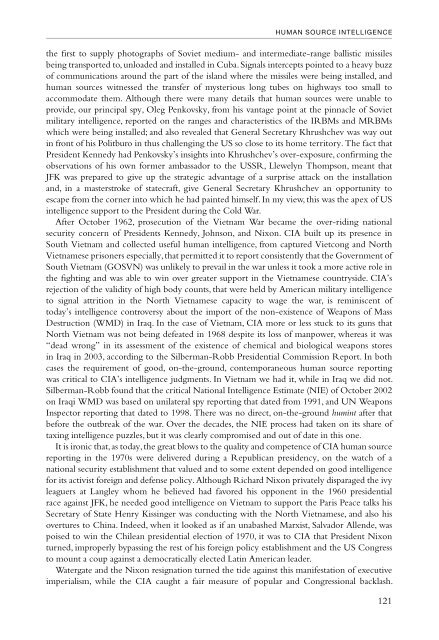Handbook of intelligence studies / edited by
Handbook of intelligence studies / edited by
Handbook of intelligence studies / edited by
Create successful ePaper yourself
Turn your PDF publications into a flip-book with our unique Google optimized e-Paper software.
HUMAN SOURCE INTELLIGENCE<br />
the first to supply photographs <strong>of</strong> Soviet medium- and intermediate-range ballistic missiles<br />
being transported to, unloaded and installed in Cuba. Signals intercepts pointed to a heavy buzz<br />
<strong>of</strong> communications around the part <strong>of</strong> the island where the missiles were being installed, and<br />
human sources witnessed the transfer <strong>of</strong> mysterious long tubes on highways too small to<br />
accommodate them. Although there were many details that human sources were unable to<br />
provide, our principal spy, Oleg Penkovsky, from his vantage point at the pinnacle <strong>of</strong> Soviet<br />
military <strong>intelligence</strong>, reported on the ranges and characteristics <strong>of</strong> the IRBMs and MRBMs<br />
which were being installed; and also revealed that General Secretary Khrushchev was way out<br />
in front <strong>of</strong> his Politburo in thus challenging the US so close to its home territory. The fact that<br />
President Kennedy had Penkovsky’s insights into Khrushchev’s over-exposure, confirming the<br />
observations <strong>of</strong> his own former ambassador to the USSR, Llewelyn Thompson, meant that<br />
JFK was prepared to give up the strategic advantage <strong>of</strong> a surprise attack on the installation<br />
and, in a masterstroke <strong>of</strong> statecraft, give General Secretary Khrushchev an opportunity to<br />
escape from the corner into which he had painted himself. In my view, this was the apex <strong>of</strong> US<br />
<strong>intelligence</strong> support to the President during the Cold War.<br />
After October 1962, prosecution <strong>of</strong> the Vietnam War became the over-riding national<br />
security concern <strong>of</strong> Presidents Kennedy, Johnson, and Nixon. CIA built up its presence in<br />
South Vietnam and collected useful human <strong>intelligence</strong>, from captured Vietcong and North<br />
Vietnamese prisoners especially, that permitted it to report consistently that the Government <strong>of</strong><br />
South Vietnam (GOSVN) was unlikely to prevail in the war unless it took a more active role in<br />
the fighting and was able to win over greater support in the Vietnamese countryside. CIA’s<br />
rejection <strong>of</strong> the validity <strong>of</strong> high body counts, that were held <strong>by</strong> American military <strong>intelligence</strong><br />
to signal attrition in the North Vietnamese capacity to wage the war, is reminiscent <strong>of</strong><br />
today’s <strong>intelligence</strong> controversy about the import <strong>of</strong> the non-existence <strong>of</strong> Weapons <strong>of</strong> Mass<br />
Destruction (WMD) in Iraq. In the case <strong>of</strong> Vietnam, CIA more or less stuck to its guns that<br />
North Vietnam was not being defeated in 1968 despite its loss <strong>of</strong> manpower, whereas it was<br />
“dead wrong” in its assessment <strong>of</strong> the existence <strong>of</strong> chemical and biological weapons stores<br />
in Iraq in 2003, according to the Silberman-Robb Presidential Commission Report. In both<br />
cases the requirement <strong>of</strong> good, on-the-ground, contemporaneous human source reporting<br />
was critical to CIA’s <strong>intelligence</strong> judgments. In Vietnam we had it, while in Iraq we did not.<br />
Silberman-Robb found that the critical National Intelligence Estimate (NIE) <strong>of</strong> October 2002<br />
on Iraqi WMD was based on unilateral spy reporting that dated from 1991, and UN Weapons<br />
Inspector reporting that dated to 1998. There was no direct, on-the-ground humint after that<br />
before the outbreak <strong>of</strong> the war. Over the decades, the NIE process had taken on its share <strong>of</strong><br />
taxing <strong>intelligence</strong> puzzles, but it was clearly compromised and out <strong>of</strong> date in this one.<br />
It is ironic that, as today, the great blows to the quality and competence <strong>of</strong> CIA human source<br />
reporting in the 1970s were delivered during a Republican presidency, on the watch <strong>of</strong> a<br />
national security establishment that valued and to some extent depended on good <strong>intelligence</strong><br />
for its activist foreign and defense policy. Although Richard Nixon privately disparaged the ivy<br />
leaguers at Langley whom he believed had favored his opponent in the 1960 presidential<br />
race against JFK, he needed good <strong>intelligence</strong> on Vietnam to support the Paris Peace talks his<br />
Secretary <strong>of</strong> State Henry Kissinger was conducting with the North Vietnamese, and also his<br />
overtures to China. Indeed, when it looked as if an unabashed Marxist, Salvador Allende, was<br />
poised to win the Chilean presidential election <strong>of</strong> 1970, it was to CIA that President Nixon<br />
turned, improperly <strong>by</strong>passing the rest <strong>of</strong> his foreign policy establishment and the US Congress<br />
to mount a coup against a democratically elected Latin American leader.<br />
Watergate and the Nixon resignation turned the tide against this manifestation <strong>of</strong> executive<br />
imperialism, while the CIA caught a fair measure <strong>of</strong> popular and Congressional backlash.<br />
121
















